Seminar on Teaching and Teaching Materials in Communication Studies & Symposium on Communication Tutorial (winner of the second prize of China’s National Textbook Construction Award) was held at the School of Journalism and Communication (SJC) of Renmin University of China in the afternoon of Dec 8.
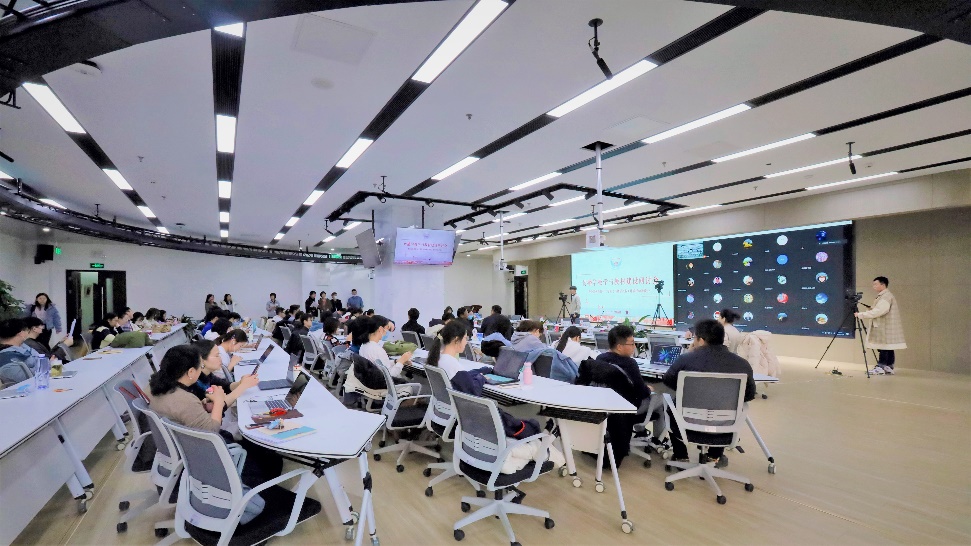
Centering on the construction experience of Communication Tutorial, nearly 30 experts and scholars discussed the development history and experience of communication studies in China and the developing trends of the discipline in the digital era.
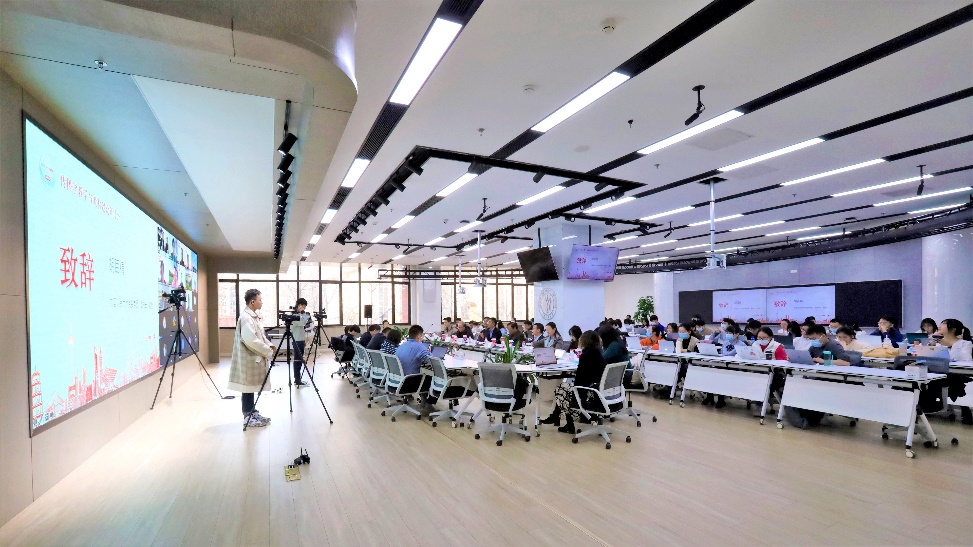
Hu Baijing, the standing committee member of China’s Communist Party Committee and vice president of Renmin University of China, gave a welcome speech and made the further explanation on the idea of "one central figure, one classic textbook".
First, Communication Tutorial written by Mr. Guo has issued over one million copies and has become a classic work that has introduced academia and the industry into the world of communication studies. It explains what it means to be a teacher, especially a respectable teacher.
Second, being highly responsible for journalism and communication education to the Communist Party of China and to Chinese people, Guo has devoted most of his life to polishing one textbook with his professionalism, demonstrating the academic traditions and ethos of Renmin University of China.
Third, Guo has always placed the utmost importance on teaching and teaching materialsand treated education as the priority of his life. It explains what is cultivation and the mission of universities.>
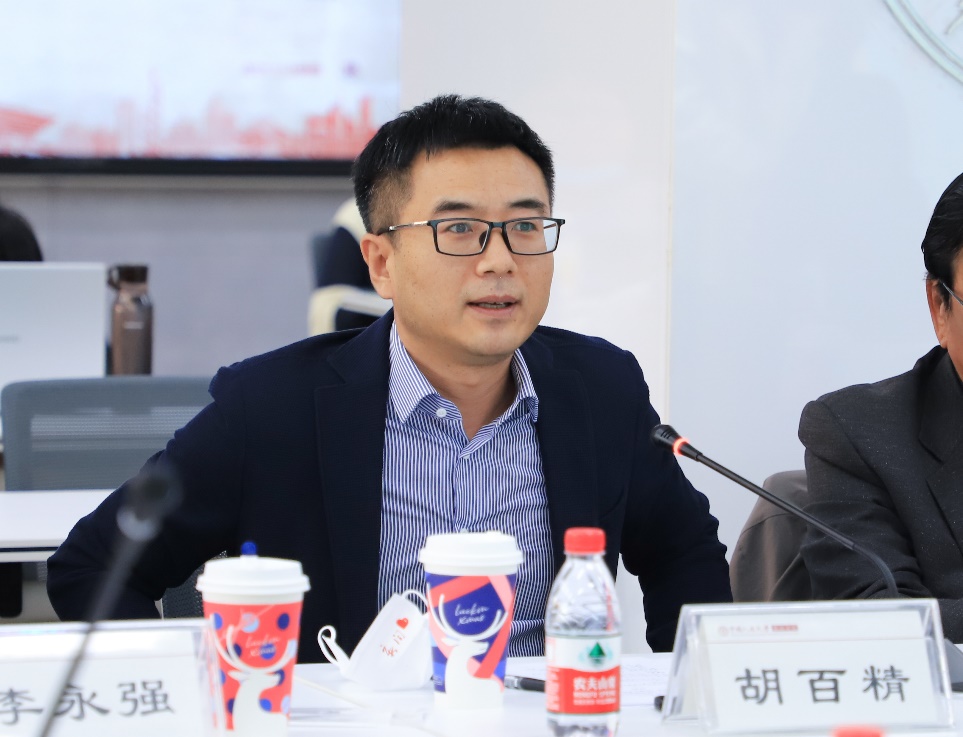
Based on his personal experience, Zhou Yong, executive dean of SJC, talked about the three historical development stages of communication studies in China and the impact of Communication Tutorial among the three stages.
When China's academia started to make a comprehensive contact with communication theories from the late 1990s to the beginning of the 21st century, the publication of Communication Tutorial laid the foundation for the development of communication studies in China.
Under the background of new technologies and new changes in society around 2014, communication studies entered a critical period of structural upgrading and transformation. Leading the faculty and students of SJC, Guo once again developed the communication discipline. He combined communication science with new media technologies and live applications, expanded the boundaries of the discipline, and updated the theories and paradigms of communication studies, laying the foundation for further transformation of the discipline.
Now the mission to develop the communication discipline has been passed to the younger generation of scholars. Zhou encouraged everyone to follow the example of the old generation of educators, so as to work together to create the future.
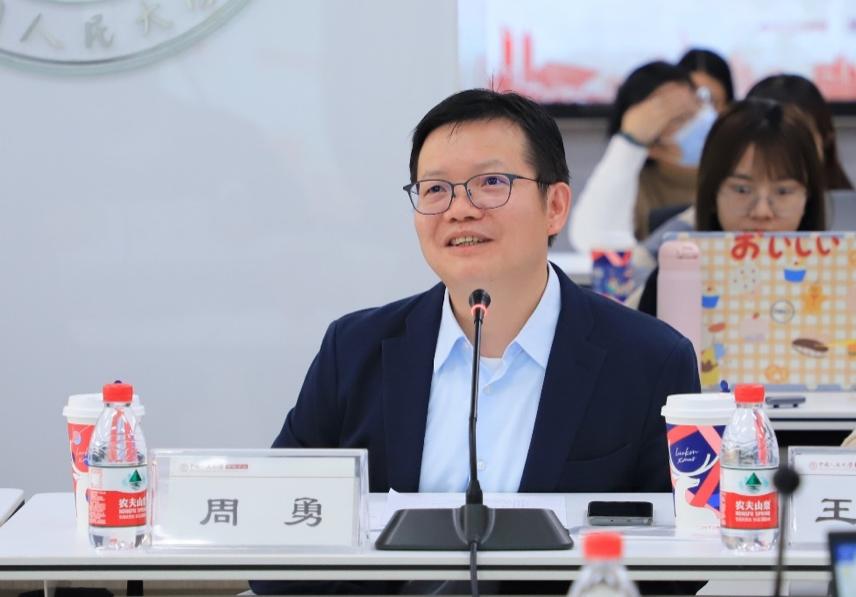
Li Yongqiang, the proprietor of China Renmin University Press (CRUP), said that Communication Tutorial is a classic with vitality, and Guo deserves his honor as the writer. According to Li, Communication Tutorial wins the popularity for its complete and rigorous system, comprehensive and systematic layout of knowledge points with focuses, and provision of a large amount of first-hand foreign language materials.
For the past 22 years, Communication Tutorial has issued over 1.5 million copies, making it one of the most influential and widely distributed classic textbooks in Chinese communication academia. Li expects the release of the new version of Communication Tutorialand hopes that CRUP and SJC will continue the sincere cooperation in the future to provide more crystallization of thoughts for the readers.
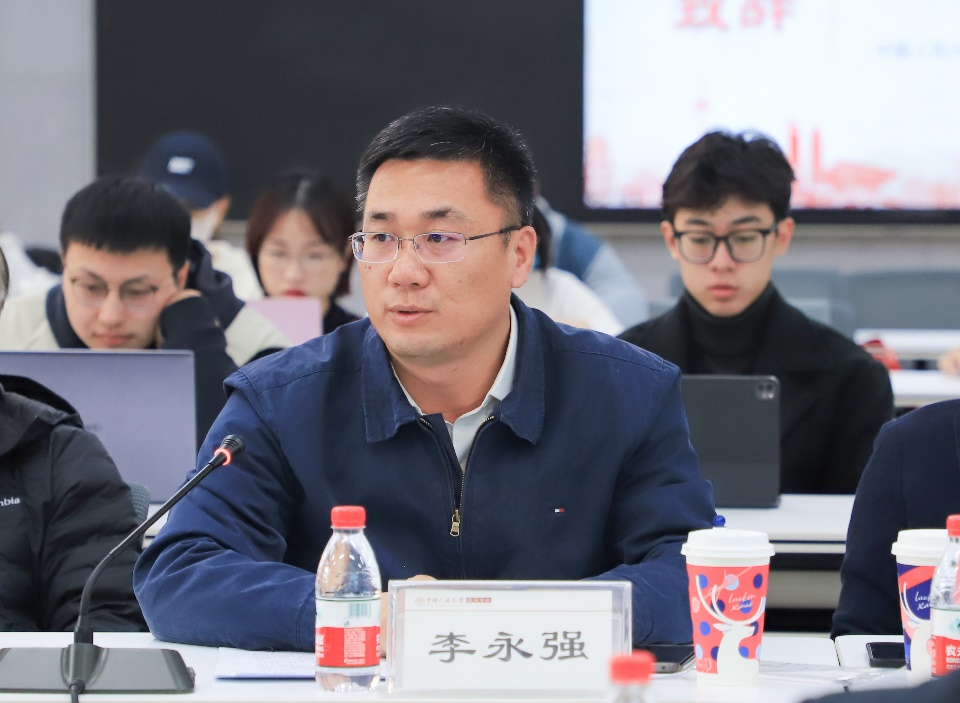
As the author of this award-winning textbook, Guo, a professor from SJC, talked about four principles for writing textbooks and put forward ardent expectations for the future development of communication studies.
First, taking the application of the Marxist view of communication in Communication Tutorial as an example, he pointed out that the textbook should be written under the guidance of correct ideologies.
Second, authors need to pay attention to scientificity when writing textbooks, especially introductory textbooks. Textbooks should incorporate mature theoriesto avoid the influence of authors’ personal views.
Third, writers should always adhere to the Chinese positionand put the principles of communication studies under the context of socialism with Chinese characteristics to construct the discourse system of China.
Fourth, authors should combine principles with practice when writing textbooks, and integrate communication into other educational fields such as vocational education,to serve the whole society.
Finally, Guo encouraged everyone to stick to the very beginning mind of learning communication science. He encouraged everyone to study human communication behaviors, to pay attention to technologies’ impact on people and their role as a double-edged sword, and to develop human-centered communication studies.
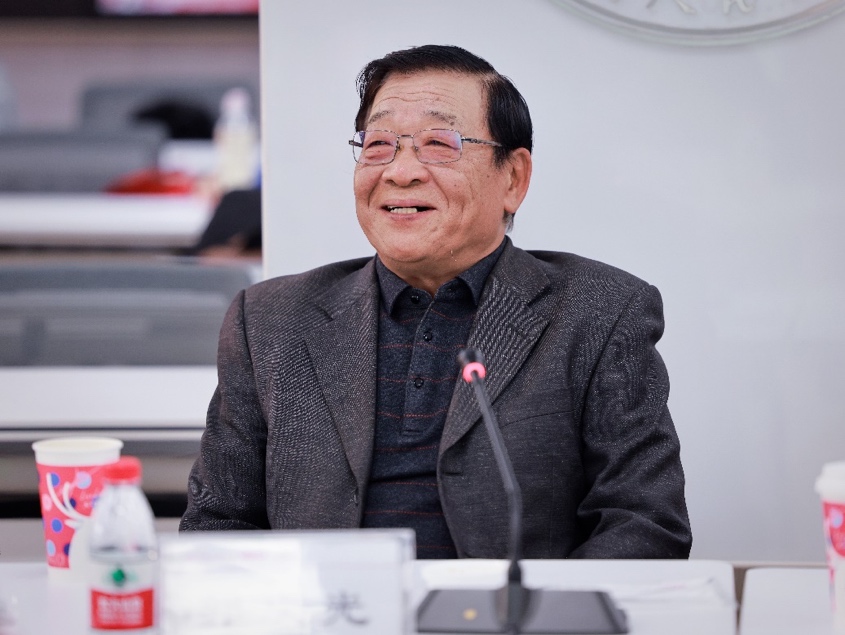
The seminar was hosted by Wang Runze, vice dean of SJC and executive director of Research Center of Journalism and Social Development of Renmin University of China. Experts and scholars from college faculties of journalism and communication across China attended the seminar.
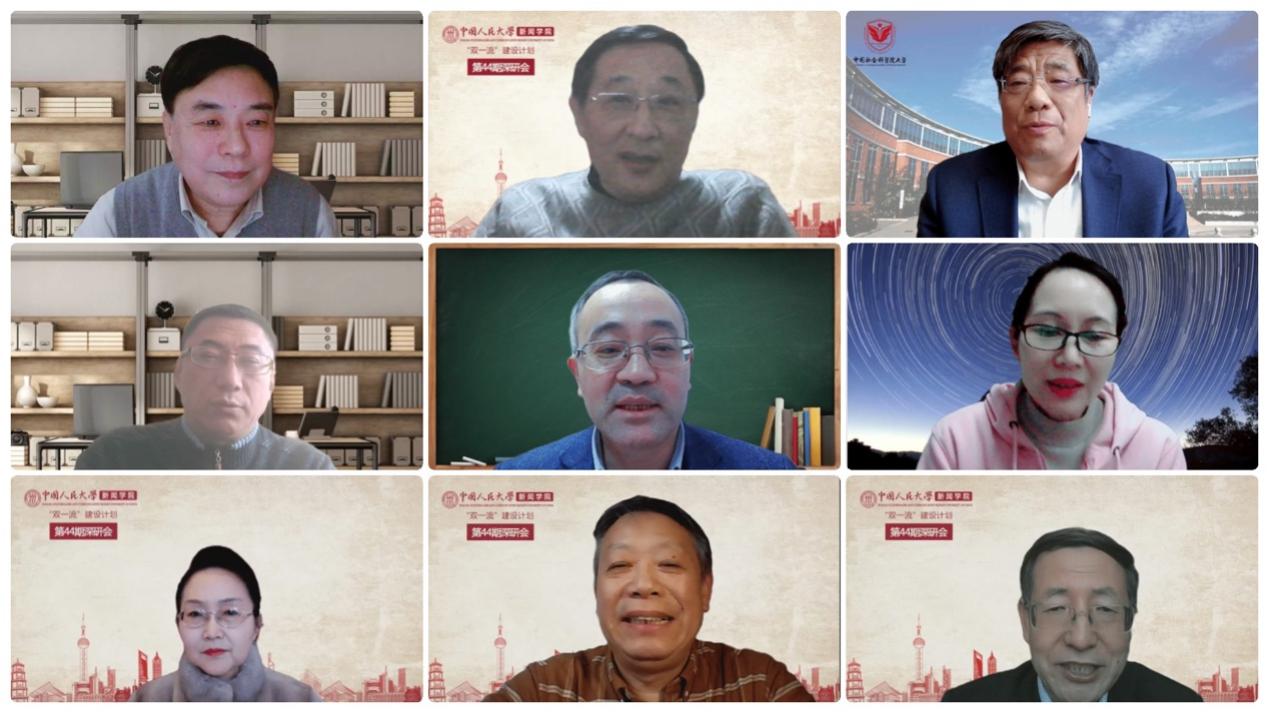
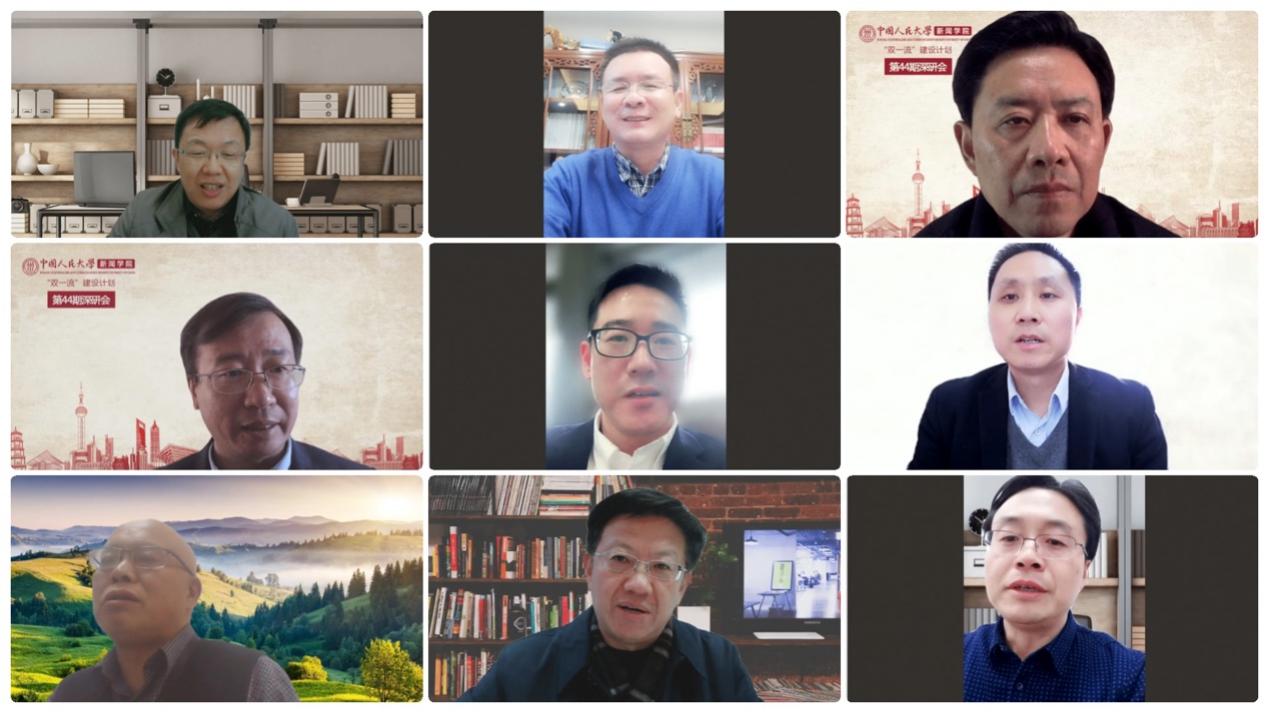

Yin Yungong, dean of the School of Journalism and Communication in Hunan Normal University, recollected his college life with Guo. According to Yin, it is Guo’s highly rigorous academic spirit for decades since he was a college student that has created the classic Communication Tutorial. In addition, Yin suggested that the writing of communication textbooks should not only focus on localization but also pay attention to the new characteristics of the new era.
Zhang Guoliang, the professor from the School of Media and Communication at Shanghai Jiaotong University, made clear three points about the basic issue of communication studies. First, the communication discipline is at the crossroads of disciplines. Therefore, it is highly scientific, cross-cutting, advancingwith the times, and should be heatedly discussed nowadays. Second, the task of communication studies is to discover the general laws of communication, whereby the boundaries and main values of the discipline will be clarified.Finally, communication research should focus on the connection with other disciplines and develop the research in a holistic approach.
Tang Xujun, dean of the School of Journalism and Communication at the University of Chinese Academy of Social Sciences, recalled his understanding process of communication science from the superficial to the core. He said the fact that Communication Tutorial has become a classic is not only the crystallization of Guo's dedication to his studies for yearsbut also a showcase of his never-changing devotion to teaching and education.
Sui Yan, dean of the School of Journalism in the Communication University of China, said that Communication Tutorial is not only an inspiring textbook with deep thoughtsbut also one that pays attention to integrating with other disciplines. The textbook covers a wide range of sociological and psychological knowledge, coinciding with the requirement of the time to build "new liberal arts".
Zhang Taofu, executive dean and secretary of China’s Communist Party Committee of the School of Journalism in Fudan University, said that being repeatedly tested by time, Communication Tutorial is not only a model textbook to enlighten students and to guide teachers, but also a sample worth studying in the construction of new teaching materials. In the era that treats knowledge as streams, the development of teaching materials needs to distill logical and structured "hard knowledge", and to form a systematic knowledge network for students. Besides, Zhang expects to work with all outstanding scholars to explore the bright future of the national textbook construction base.
Chen Changfeng, executive vice dean of the School of Journalism and Communication in Tsinghua University, pointed out that Communication Tutorial is not only a classic textbook in the field of journalism and communicationbut also a record of the changes and developments of the whole discipline, which is closely related to the social modes and social practices in China. From the perspective of an administrator of the School of Journalism and Communication in Tsinghua University, Chen believes that Guo has done a lot of pioneering and exemplary work. As a scholar, Guo is veritably a respectable teacher with professionalism, deep thoughts, and high standards.
Jiang Xiaoli, the professor from the College of Literature and Journalism in Sichuan University, said that Communication Tutorial is a milestone in reforming the education, teaching, and teaching materials of communication studies in China. It is important in laying down the foundation, boundaries, and functions of communication studies in China. Taking developing teaching materials as the base and academic development as the vision, Guo integrates the theories, materials, and opinions of communication studies into the book, so as to translate disciplinary theoretical innovations into teaching contents effectively, and to use this high-quality textbook to educate students and make them mature. This book not only proves Guo's pursuit and perseverance for decadesbut also demonstrates his visionary insight in teaching.
Zhang Kun, distinguished dean of the School of Journalism and Communication in Minzu University of China and professor from Journalism and Information Communication School of Huazhong University of Science and Technology, congratulated SJC of Renmin University of China on its outstanding performances in the first National Textbook Construction Award. He believed that SJC has led the way in all aspects of textbook construction, discipline construction, and curriculum construction and has achieved remarkable achievements. He complimented Guo's contribution to SJC and to the textbook construction of the discipline of journalism and communication. He also expressed his expectations for the updated version of the Communication Tutorial.
Li Benqian, dean of the School of Media and Communication in Shanghai Jiaotong University, believed that Communication Tutorial is deemed to succeed. First, Guo has grasped the key points in communication textbooks, i.e., the Marxist view of communication and China’s position in communication with Chinese characteristics. Different from traditional communication studies, Communication Tutorial enjoys foresight and stands in line with the changes of the international situation and the development of China. Second, with the development of technology, the boundaries of communication studies are expanding, while Guo focuses on the very beginning mind of communication research, i.e., to explore the laws of human communication behaviors, which guides the development of communication studies in the new era. Finally, Communication Tutorial can become an "admission office" of the communication discipline for it overviews the whole complex communication knowledge system in the simplest way.
Shan Bo, a professor from the School of Journalism and Communication of Wuhan University and director of the Center for Studies of Media Development in Wuhan University, summarized thousands of readers’ comments on Communication Tutorial from a platform. These comments show that Communication Tutorial is systematic, knowledgeable, professional, logical, and readable, allowing readers to learn new things every time they read the book. He said that based ontraditional Western communication paradigms, Communication Tutorial takes Oriental perspectives and Guo’sthoughts and judgments into the book, making it one of the books that arousemost readers’ comments and college life memories.
Xie Xinzhou, director of the New Media Studies Institute in Peking University, said that Communication Tutorial clarifies the research objects and the basic issues of communication studies. It closely connects communication research with China's social and economic development, serving as a pioneer in communication studies with Chinese characteristics and a milestone in China’s communication research and disciplinary development. Inspired by this book, Xie believes that, on the one hand, with the changes in the communication landscape and communication environment, communication studies should pay attention to innovating by integrating traditional communication theoretical systems. Communication studies also need to seek innovation in theoretical paradigms and methodological systems from the evolution of technologies and social development. On the other hand, communication studies should respond to the real concerns of China's society and reflect a communication research perspective and theoretical system with Chinese characteristics, on the basis of China's political, economic, social, and cultural practices.
Dong Tiance, dean of the School of Journalism in Chongqing University, said that Communication Tutorial reflects Guo's profound knowledge and skills, and plays an important role in leading future generations and promoting the development of communication studies in China. Dong believes that in addition to learning knowledge, junior scholars should also learn Guo's academic qualities of concentration, quietness, diligence, and perseverance, and pass them on. Scholars should return to the right path of the academy in order to achieve true scholarship.
Liao Shengqing, dean of the School of Journalism in Yunnan University, put forward three points against the developing trend of communication studies in the digital era. At the time of building a community with a shared future for mankind, Liao believes that 1. communication studies will shoulder more responsibilities in national security and national development; 2. The balance of scientific and ideological attributes of communication studies will be more distinct; 3. communication science will gradually become diversified research and cross-disciplinary research. It will interpret and analyze data to explore communication behaviors and communication laws of mankind by integrating with other disciplines, especially natural science.
Centering on the theme of the developing trend of communication studies in the digital age, Wei Lu, dean of the College of Media and International Culture from Zhejiang University, talked about how to inherit and innovate on the basis of the Communication Tutorial from three aspects. He said that in the future, communication studies should consider how to reflect Chinese characteristics, Chinese concepts, Chinese theories, and Chinese ideas in its development, in order to reverse the current Western-centrism in global communication studies. Besides, for sustainable development, communication studies must be developed in a cross-disciplinary way, so that scholars from different disciplines can conduct research around common problems of China as well as of the world. Also, communication studies should reflect the trend of humanization, and pay more attention to human values and human liberation, so that communication theories can better guide practices and enhance human welfare.
Zhang Mingxin, dean of the Journalism and Information Communication School of Huazhong University of Science and Technology, believes that Communication Tutorial not only establishes a fundamental system of communication knowledge, theories, and methodologiesbut also shows what a communication scholar should do to undertake solid academic research and to establish the awareness of creating classics. He pointed out that contemporary and future generations of scholars have the responsibility to further develop the system of communication knowledge, theories, and methodologies, to keep pace with the times against the new communication context, and to undertake cross-disciplinary research in order to create new communication knowledge, theories, methodologies, and paradigms.
Liu Mingyang, executive vice dean of the School of Journalism and Communication in Shandong University, recalled his experience as Guo’s doctoral student. He said that Guo teaches students according to their abilities and arranges students’ study tasks according to their characteristics. Serving as a light for many students, Guo solves students’ confusion and gives them guidance in all aspects timely.
Chen Long, executive dean of the School of Communication in Soochow University, started from the origin of writing Communication Tutorial. He believes that Communication Tutorial is a simple textbook with rich knowledge, integrating Chinese and Western theories and having a broad and pioneering vision in the rigid textbook system in the 1990s. Inspired by this book, Chen proposed that 1. communication studies urgently need to incorporate new contents of media practices in order to summarize new laws of media practices; 2. communication studies should absorb both scientific and humanistic knowledge to avoid going to the extreme of instrumental rationalism; 3. the construction of teaching materials for journalism and communication disciplines should be based on the current needs, especially the need for constructing new liberal arts. The discipline can be enriched by absorbing the knowledge of other disciplines such as big data and artificial intelligence.
Xu Jiabiao, dean of the School of Journalism and Communication in Shaanxi Normal University, said that Communication Tutorial was an important book that had taught him how to study and do research. He elaborated on the values of the book from three perspectives: the unification of professionalism and readability, the unification of fundamentals and innovations, and the unification of universality and localism. In addition, Xu gave his opinions on the future development of communication studies. First, communication research should be more than a pursuit for perfection and scientificity in methodology. It should explore innovations in ideas. Second, communication studies should study complete people, people with flesh and blood, emotions, and warmth, so that communication studies can enjoy tenacious vitality.
Hu Yiqing, vice dean of the School of Journalism and Communication in Nanjing University, talked about the profound influence of Communication Tutorial on him. On the one hand, Guo has set an accurate and correct tone of the book from the perspective of the Marxist view of communication. On the other hand, Communication Tutorial has summarized the development achievements of communication studies in an era and has opened many "doors" for the younger generation of scholars, laying the foundation for the future development of communication studies. He believed that with the pioneering endeavors of the older generation of scholars like Guo, we now have more confidence and strength to accept the test of time in the new era of digital media, although communication studies are facing changes and adjustments again.
Liu Tao, secretary of China’s Communist Party Committee of the School of Journalism and Communication in Jinan University, explained the inspiration brought by Communication Tutorial to the construction of teaching materials from two aspects. On the one hand, the construction of the knowledge system in teaching materials should adhere to the unification of systematicity and scientificity. The knowledge system should be concluded by placing the course in certain communication practices and cultural contexts. On the other hand, the problem of the new and old, i.e., the problem of the relationship between professionalism and extensibility, in the construction of teaching materials should be solved with care. In the new media era, it is important to grasp the core content of a course, rather than just catching up with new technologies and new phenomena.
Chao Naipeng, dean of the School of Media and Communication in Shenzhen University, said that Guo’s narration on the heart of communication studies inspired him a lot. He believed that the base of communication research is human communication behaviors. In the digital transformation of communication studies, two fundamental issues should be noticed. One is digitality. Conceptualization is one of the most fundamental starting points of academic research and some fundamental concepts of communication studies in the digital era must be refined and re-understood. The other one is computational communication, which is not a single theory nor a single method, but a set of collective concepts.
Yang Baojun, director of the Academic Committee of SJC in Renmin University of China, explained the authority and classicality of Communication Tutorial from four aspects. First, the book takes the core theories of communication studies as the main body, and constructs the system of basic theories, relations, and knowledge, unifying the connections between schoolsand scholars. It has a stable and long-lasting value, setting an example for writing and revising textbooks. Second, Communication Tutorial has influenced across generations and has become a favorite work for generations of students, teachers, and researchers. Third, the book has influenced fields and across disciplines. Fourth, the content of the book reflects all the necessary characteristics of a textbook, including theoretical nature, academic position, consensus, integrity, inclusiveness, and moderate innovation and openness.
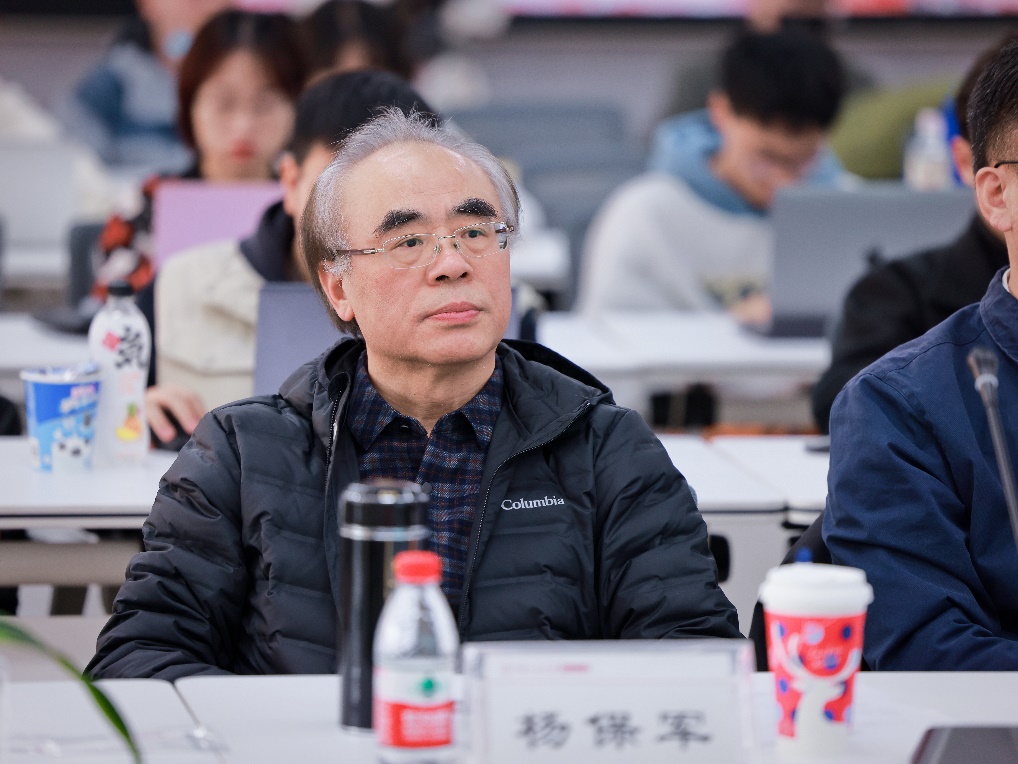
Liu Hailong, the professor from SJC, said that Communication Tutorial has an open yet complete knowledge structure. It is of great foresight, systematically introducing many frontiers of communication studies, and covering other forms of communication besides mass communication. In this book, Guo emphasizes the interpretation of core theories, which facilitates readers’ proper understanding of the basic questions of communication studies such as "what is communication" and helps other disciplines to treat communication science in a comprehensive and accurate way. In addition, with practical significance, the book is not only enlightening to communication studies, but also to other disciplines and industries.
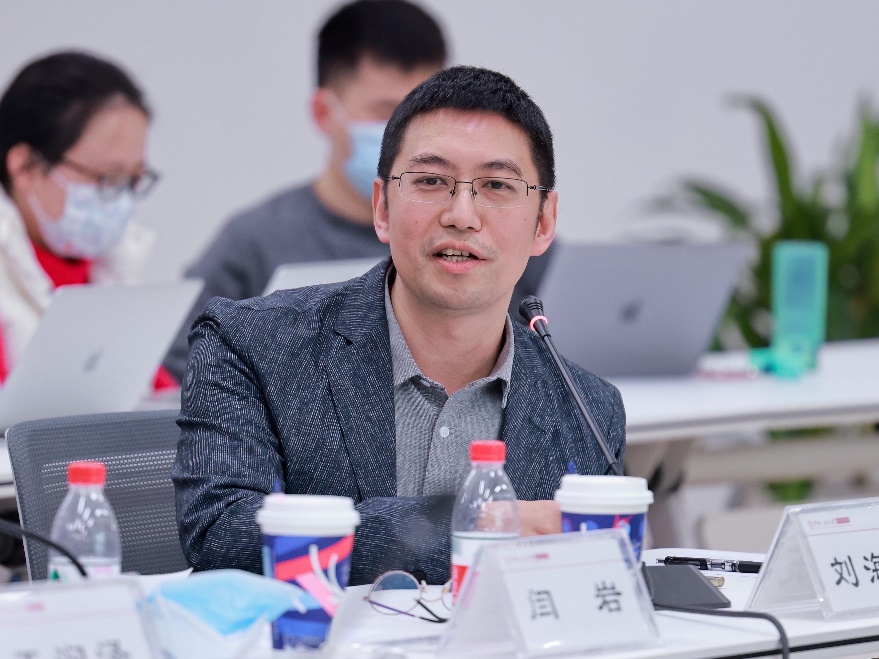
Yan Yan, deputy secretary of China’s Communist Party Committee of SJC, told the story between Communication Tutorial and herself. She described how a good textbook has changed the life of a young student. She said that Communication Tutorial explains the connotation of communication studies for countless young people in a simple and concise way, and guides the scholars who love communication science to continue academic research and innovations.
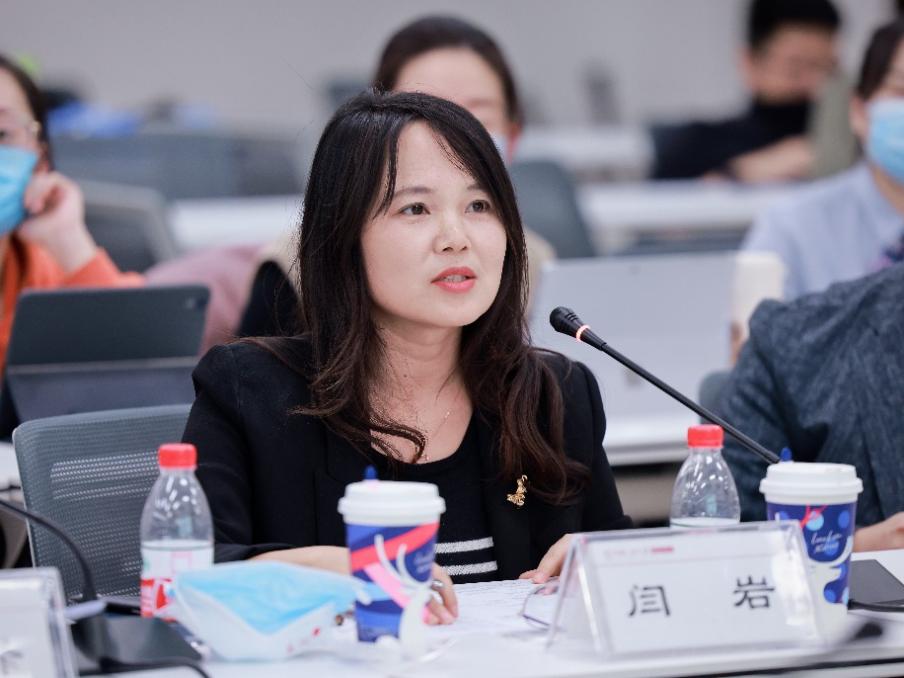
Wang Yigao, associate professor from SJC, talked about Communication Tutorials from three perspectives. First, this textbook unifies the guiding ideology and different schools of thought, which is consistent with Guo's other articles and textbooks. Second, it unifies social applicability and theoretical abstractness. Third, it unifies the form and content. Wang said that the conciseness and fluency of the textbook givereaders the enjoyment of beauty which is worthy of our study.
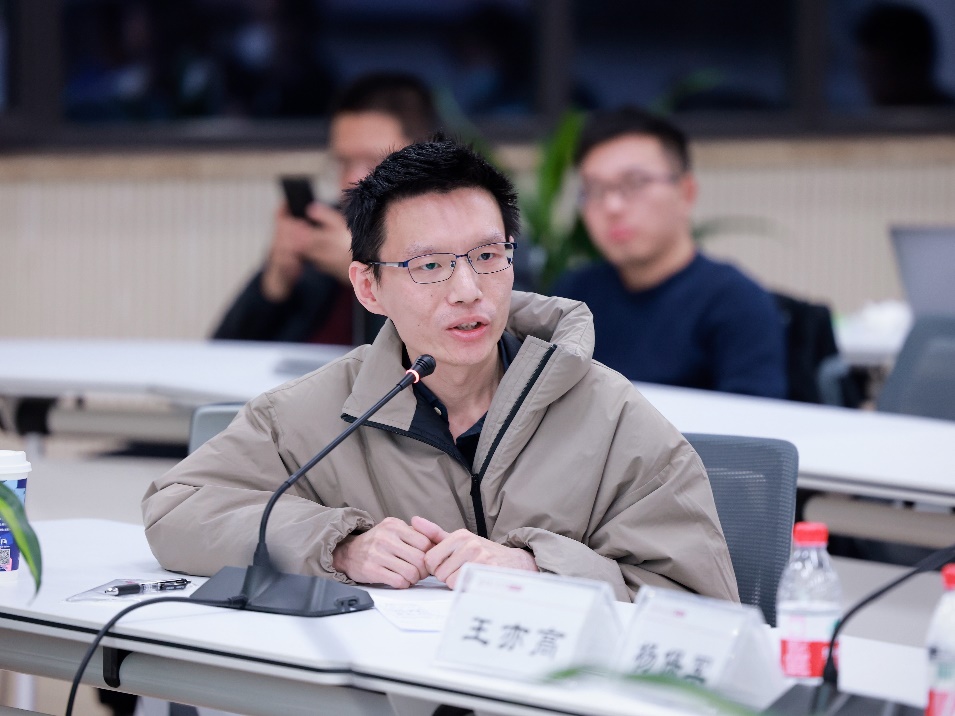
Wang Runze, vice dean of SJC and executive director of Research Center of Journalism and Social Development of Renmin University of China, addressed to conclude the seminar. She points out that nowadays when journalism and communication studies are facing reform, Communication Tutorial is still constructive for the development of communication science and the construction of teaching materials. At the same time, every expert expressed their insightful opinions on communication studies and the knowledge system, history, and future development of journalism and communication, which showed the collective wisdom of scholars. On behalf of SJC, Wang expressed her gratitude to Guo and all the other teachers who attended the seminar.
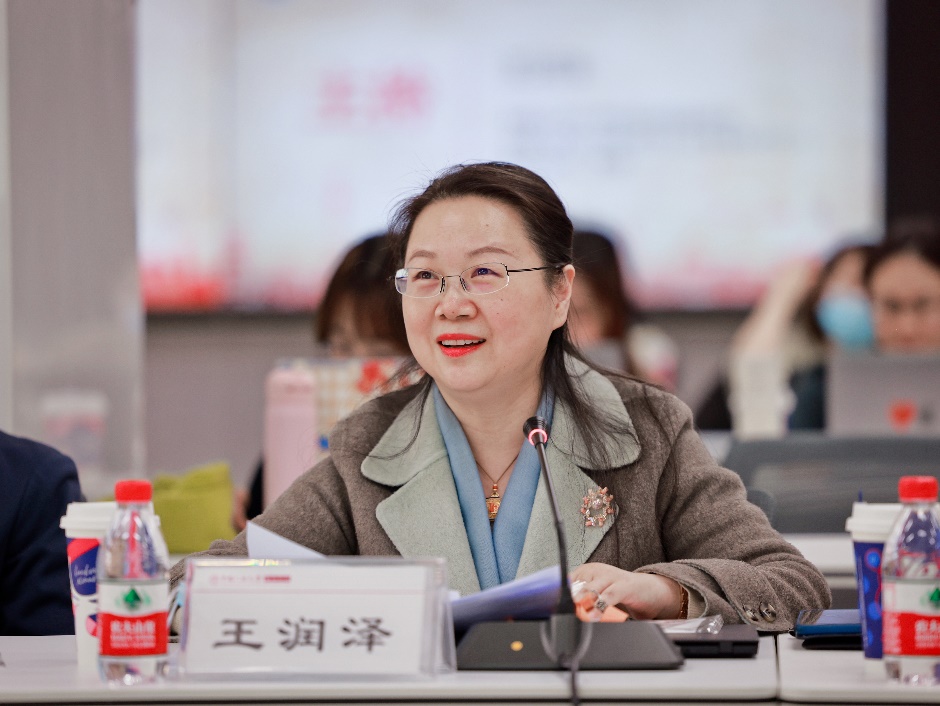
Aiming at key issues in the development of journalism and communication academia, Seminar for Innovation in Academic Discourse of Journalism and Communication is one of the research projects of SJC to construct “Double-First Class”. By carrying forward the spirit of driving nails in scientific research, and collecting the wisdom of authoritative experts in related fields, this project expects to push innovation in education and research of certain fields through the discussion of every specific question. Since 2018, the School of Journalism and Communication in Renmin University of China, Research Center of Journalism and Social Development of Renmin University of China, and the Journalism and Communication Committee of China Association of Higher Education have jointly launched a series of small yet in-depth seminars. Every seminar focuses on one theme and invites experts and scholars to conduct in-depth discussions. (End)
Author: You Wenhui, Ying yingwen
Photo by: Yang Yuran, Peng Chunting, Ying yingwen
Editor: Jiang Wenyue
Translator: Guan Yilun



